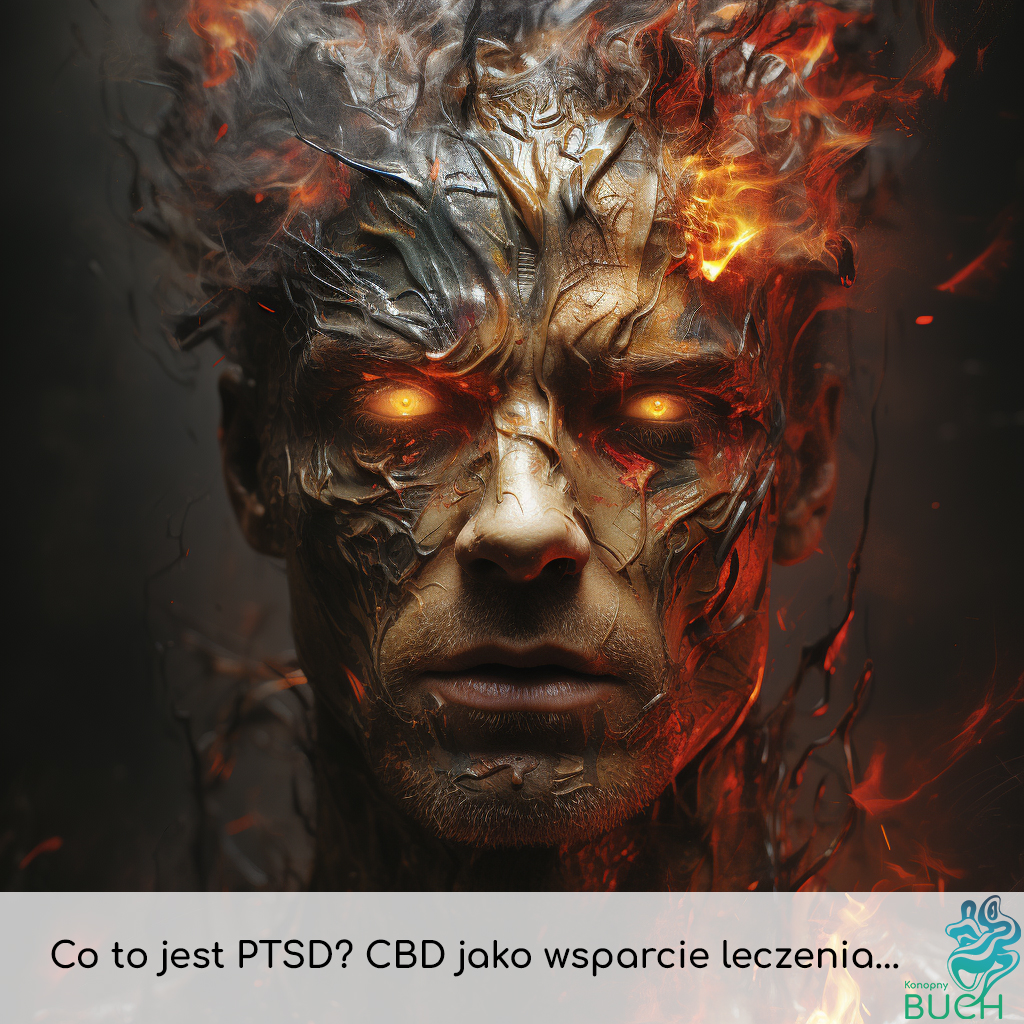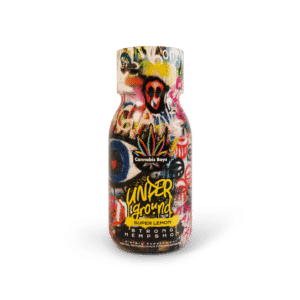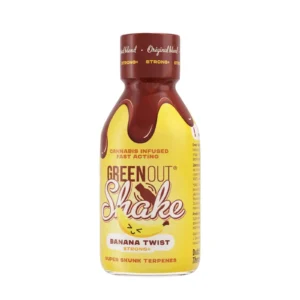Contents
Post-traumatic stress - PTSD (Post Traumatic Stress Disorder) is a set of symptoms that develop in approximately 20% of people after a traumatic experience. It is diagnosed in people whose symptoms persist for more than a month after the traumatic event. The basis of PTSD treatment is psychotherapy, often combined with pharmacotherapy (antidepressants and antianxiety drugs). Hemp cannabinoids, including: CBD may support the treatment of post-traumatic stress.
What is trauma?
Trauma is an event in connection with which a person experiences extreme stress resulting from fear for their health and life. According to the definition of the American Psychological Association, a traumatic event results in a significant level of fear, helplessness, dissociation, disorientation, or other emotions that interfere with normal functioning and that are strong enough to cause long-term consequences for the person's life, sense of security, view of the world and society. myself.
There are two types of trauma:
- Type one trauma: a single, extremely stressful event that may result in post-traumatic stress disorder (PTSD).
- Type two trauma – relational trauma: repeated, highly stressful events, most often occurring in close relationships or everyday functioning. Type two traumas include long-term exposure to physical violence, psychological violence, emotional abuse and neglect, or sexual harassment. People exposed to this type of trauma experience other consequences, e.g. they may develop personality disorders, dissociative disorders, the so-called “complex PTSD”, the diagnosis and treatment of which is different than in the case of PTSD .
Not everyone who experiences a traumatic event will develop PTSD. Immediately after an extreme situation, 30% of people experience an acute stress reaction (ASR). ASR symptoms usually disappear on their own within a few days of the single trauma if the person is in a safe, supportive environment. PTSD develops in approximately 20% of people after a traumatic experience and can be diagnosed if the symptoms persist for more than a month and have a significant impact on their daily functioning.
What experiences can trigger PTSD?
Initially, PTSD was only diagnosed in soldiers returning from the front. The set of symptoms was called "soldier's heart" during the Civil War or "veteran's fatigue" during World War I. As psychiatry and psychology and diagnostic methods developed, post-traumatic stress began to be discussed in the cases of people who had experienced other extremely stressful events.
Events that, according to current knowledge can cause PTSD:
- rape (49%),*
- physical violence, assault (32%),
- traffic accidents (16.8%),
- threat to the child's life (10.4%).
- witnessing the above / the above affected a loved one (7.3%),
- natural disasters (3.8%).
(*percentage of people who may experience post-traumatic stress after a given experience)
In each of the above-mentioned cases, we are dealing with an extreme experience that makes the person feel that his life and bodily integrity are in danger. This person experiences extremely severe stress that exceeds the person's emotional ability to cope.
Diagnosing PTSD according to DSM-5
DSM-5 (Diagnostic and Statistical Manual of Mental Disorders) is the current classification of mental disorders by the American Psychiatric Association. According to her, post-traumatic stress can be diagnosed when a person after a traumatic experience develops the following symptoms :
- re-experiencing a traumatic situation (at least 1 of the following):
- intrusive memories
- dreams related to the event,
- flashbacks,
- intense, prolonged stress reaction to factors that remind us of the event (also physiological).
- persistent, unyielding avoidance of thoughts, feelings, places, conversations related to the event, situations and people associated with the event, difficulty remembering the circumstances of the traumatic situation, isolation, alienation, feeling of no future,
- hyperactivity (min. 2 symptoms from the list): high alertness, anxiety, sleep disorders, concentration disorders, irritability, outbursts of anger,
- symptoms disturb the person's functioning,
- the symptoms are not related to the use of psychoactive substances,
- optional: depersonalization, derealization.
Davidson Trauma Scale - diagnosing PTSD
The Davidson Trauma Scale was created in the late 1990s and is a questionnaire tool that helps psychiatrists and psychologists assess the scale of trauma in people after experiencing trauma. The scale is used for an initial assessment of the mental state, which helps to select appropriate therapeutic procedures .
CBD as support for the treatment of PTSD
Hemp cannabinoids , including CBD, have a number of properties that can support the therapy of people after a traumatic experience. These include:
- regulation of circadian rhythm, facilitating falling asleep,
- mood regulation,
- anti-anxiety and calming properties,
- supporting the body's regeneration,
- improvement of appetite,
- supporting processes related to remembering and processing memories,
- relieving stress.
Hemp cannabinoids are currently the subject of scientific research around the world, scientists see the huge potential of hemp medicine in somatic diseases and mental disorders. Medical cannabis is already prescribed to patients experiencing post-traumatic stress, anxiety , depression and insomnia.
What is PTSD and what experiences can cause it?
PTSD – post-traumatic stress – is a set of symptoms that develops in some people (approx. 20%) after experiencing trauma. It was originally observed in soldiers returning from the front. As diagnostic methods developed, post-traumatic stress began to be diagnosed in people who had other experiences causing trauma of similar intensity. These are situations in which a person experiences extremely severe stress that exceeds his or her ability to cope and feels that his or her life and bodily integrity are in danger.
Traumatic situations that may cause PTSD currently include sexual violence, physical violence, assault, traffic accidents, natural disasters, threats to the life of a child or another close person, or witnessing all the above-mentioned situations that involve other people. PTSD most often develops in people who have experienced rape (49% of people with such experience) and physical violence/assault (32%).
Importantly, PTSD is distinguished from ASR - an acute stress reaction. Both syndromes have similar symptoms, but ASR lasts up to a month after the traumatic event and disappears spontaneously if the person experiencing them is in a safe environment. After this time, we talk about PTSD.
PTSD according to the American Psychiatric Association:
According to the DSM-5 diagnostic criteria, PTSD can be diagnosed if a person, after experiencing a traumatic event, experiences for more than a month:
- re-experiencing the event:
- intrusive memories,
- dreams related to the event,
- flashbacks,
- intense stress reactions (psychological and physiological) to factors that remind us of the event,
- persistent avoidance of thoughts, feelings, places related to the event, avoidance of conversations about it and people and situations associated with it, isolation, alienation, feeling of having no future,
- sleep disorders, concentration disorders, outbursts of anger, anxiety, vigilance,
In PTSD, these symptoms disturb the person's functioning, last for over a month and are not related to the use of psychoactive substances. They may be accompanied by a sense of derealization and depersonalization.
Psychotherapy and pharmacotherapy - treatment of PTSD
Psychotherapy is one of the basic ways of treating people who suffer from PTSD. As research on trauma, psychotraumatology and crisis intervention in psychology developed, many therapeutic methods aimed at people after trauma were developed.
In most of them, psychologists assume that trauma causes the freezing of emotions and thoughts related to the event, which is why people experiencing PTSD are unable to gain distance from it and keep reliving it. The goal of psychotherapy may be to process the traumatic event in consciousness and create distance from it so that it stops affecting the person's life so intensely.
Pharmacotherapy is often based on antidepressants (e.g. SSRIs), which help control symptoms of depression and anxiety. On an ad hoc basis, if symptoms are severe, benzodiazepine drugs may also be used.
CBD as support for PTSD
Medical dried hemp has been approved as one of the methods supporting PTSD psychotherapy in many countries around the world. In scientific research on this topic, the following properties of hemp are mainly taken into account:
- anti-anxiety effect,
- regulation of sleep and wakefulness rhythm,
- regulation of processes related to remembering and processing memories,
- alleviating intrusive thoughts about trauma and flashbacks.
Selected research on the use of dried hemp in PTSD
- In a study conducted with war veterans, a statistically significant group experienced improvement in symptoms such as anxiety, fear and insomnia. Under the influence of cannabinoids, the subjects coped better with difficult memories and emotions.
- In another study, researchers used a well-being reporting app. The study participants - people with PTSD - provided researchers with information about their symptoms during cannabis . Approximately 12,000 reports were analyzed and sent by 400 people over 2.5 years. Immediately after taking the drug, 98% of respondents felt less intensity of intrusive thoughts about trauma, 97% felt less sensitivity, the level of fear and anxiety decreased in 93% of respondents, and 92% experienced fewer flashbacks. The researchers pointed out that these effects may cease after the end of cannabis therapy, indicating the need to repeat the study in more controlled conditions and with the participation of people undergoing psychotherapy at the same time.
Scientists see the therapeutic potential of CBD and other hemp cannabinoids in the treatment of post-traumatic stress, but indicate the need to conduct more research with a different, more controlled course. This approach could lead to the creation of cannabis-based drugs supporting the treatment of mental disorders, including PTSD.










[...] add to dishes or use externally - e.g. for massage or bathing. CBD hemp oil is very effective in treating many ailments, such as inflammation, muscle pain and stiffness, and insomnia. […]
[…] CBD is also being studied for potential effectiveness in treating other conditions such as Alzheimer's disease, Parkinson's disease, multiple sclerosis, and epileptic seizures. […]
[…] post-traumatic stress […]
[...] when used topically, they can provide additional support for acne treatment - but to learn the best and most effective ways to use these […]